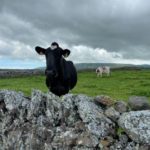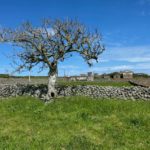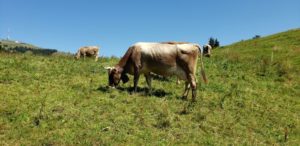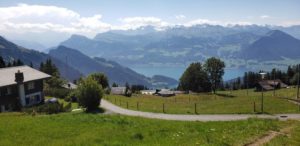Birgit (40s) Interview conducted remotely aboard the R Heritage Too
I have been invited to travel with friends in the past. When detailed agendas were put together to visit the locations most popular with tourists, I asked, will there be any time to wander rural landscapes or walk through fishing villages?
I was promptly uninvited. To me exploring the earth is about meeting the people who make it go around. Farmers, fishermen, teachers and shop keepers are far more interesting to talk to than lawyers and bankers. Places like Vegas, all inclusive resorts or cruise ships full of people who speak the same language are my travel nightmares.
Today I spent the afternoon wandering the rural landscape to which I am drawn, taking pictures of cows, goats 


 and stone ruins. April in the Azores is still on the stormy side. It has been windy and overcast far more often than sunny. In my three hours of walking, a farmer passed me on his tractor, calf in tow, followed by an individual on a 4-wheeler who I assume was a farm hand. It is hard not to “heart” the cows of the Azores. They are curious animals which often walk up to the old stone walls which surround the pasturelands. It was an especially clear day. One of the first days in six weeks with a clear view of the highest spot on Terceira.
and stone ruins. April in the Azores is still on the stormy side. It has been windy and overcast far more often than sunny. In my three hours of walking, a farmer passed me on his tractor, calf in tow, followed by an individual on a 4-wheeler who I assume was a farm hand. It is hard not to “heart” the cows of the Azores. They are curious animals which often walk up to the old stone walls which surround the pasturelands. It was an especially clear day. One of the first days in six weeks with a clear view of the highest spot on Terceira.
Since interacting with people is still highly discouraged in the Azores I have been reaching out to old friends whom I feel might be able to shed light on life in different parts of the world. Birgit moved to Niwot where I grew up as a child. I recall her joining one of my most remarkable teachers classes, Mr Easterday, in the 6th grade. In addition to living in Switzerland, Birgit has also lived in Germany, Colorado, Arizona and Alaska. I thought her experiences in the US and abroad could provide us all an opportunity to compare the viewpoints and lifestyle priorities of people in other parts of the world. Her words follow.
What is your favorite part of living in Switzerland?
There is a deeply rooted sense of self responsibility here. It is fundamental to who the Swiss are as a people and it is even a part of our constitution. Article 6 reads All individuals shall take responsibility for themselves and shall, according to their abilities, contribute to the tasks of the state and society. You see this lived by the Swiss people. At our ski areas in the Alps there are no out of bounds markers or warnings about cliffs. It is assumed you will take the time to learn and be aware of these hazards yourself. Five or six year old children walk to school by themselves and their parents believe that it is important to teach them how to be responsible for themselves at an early age. When I moved here from the States my son had to take a train all the way across Zurich to the school he attended. The Headmaster was aware I was from America and told me I wasn’t allowed to drive him.
Switzerland is a direct democracy and every person’s vote is counted. In 1291 the people kicked out aristocracies. Guilds and labor unions had a big influence in how the country developed. Here 70-80% of wealth is held by the middle class. It is safe, almost like going back in time to when we were young in Colorado. Even though my son travels across a big city alone I know he won’t be mugged or be a victim of gun violence. There are no active shooter drills like those that go on in the US that scare kids. I’m a speech therapist and worked in a kindergarten in the USA and can distinctly remember a child saying you can’t open the windows because that’s how the bad guys get in.
Schools are also challenging in Switzerland. You must pass difficult exams at 16 to be able to go onto college preparatory coursework. Those who do not pass these exams are placed in apprenticeships. Most kids choose not to even take the exams, they would rather do an apprenticeship. These apprenticeships are 2 days of class work and 3 days of hands-on work and last for 2-4 years until you become skilled at the trade you choose. For example you might become a master carpenter or master baker. These jobs are valued by the Swiss people and pay livable wages. Here you can support your family by working a single job in the trades.
Switzerland is a neutral country and the Swiss people do not criticize world leaders. They feel that their status as a neutral country empowers them and they take pride in starting conversations between countries. One of the UN headquarters is in Geneva. The Swiss people are very hard workers, but they also place a high value on time off. Small shops all close over lunch and big shops are open from 8 to 8. On Sundays, everything is closed and people spend time with their families, often hiking in nature.
 Because people take pride in being hard workers and making a positive contribution to society the quality of Swiss made products tends to be very high. There are a lot of small farms with 5-10 cows and people go out of their way to buy their products to support their fellow countrymen. Local foods are all pesticide free. In order to be able to use pesticides here you must prove that it is absolutely necessary. It is another aspect of looking after the people and the land that I appreciate,
Because people take pride in being hard workers and making a positive contribution to society the quality of Swiss made products tends to be very high. There are a lot of small farms with 5-10 cows and people go out of their way to buy their products to support their fellow countrymen. Local foods are all pesticide free. In order to be able to use pesticides here you must prove that it is absolutely necessary. It is another aspect of looking after the people and the land that I appreciate,
What is your least favorite part of living in Switzerland?
Labor is expensive. For example, I took in my bike to be repaired and it cost $300. The job was very well done and the bike came back running like new. Despite the price, I felt good that the bike repair man could support his family. Another thing I do not like is that people are in your business. If you jaywalk the little old ladies will yell at you. You follow traditions and rules or you are thought of as a trouble maker and you are not contributing to making the Swiss society better. Women’s rights are low on the list of opportunities for improvement and women are treated poorly in comparison to other highly developed countries. Despite overall violence being very low, domestic violence is high.
Do you see the changes to the world where you live?
Absolutely, it is very apparent in Switzerland. You can see it clearly each winter in the snow level rise. Ski areas that have been around for 100 years are not able to operate because they no longer receive snow. There is a small local area with a T-bar that wasn’t used at all this year. Skiing is a big part of the culture here. Schools host affordable ski camps to make skiing accessible to all children but these outings are becoming logistically more difficult as local ski areas close. I also have some pictures of my father ice skating on lake Zurick when he was young but it does not freeze anymore.
This spring it has not rained in a month which is unusual since spring is normally a rainy season. When I was young, if it was 28℃ the teacher would cancel class and send us swimming. Now the summers are consistently this temperature and becoming increasingly hotter. This is a huge impact in a short amount of time. Nobody ever installed air conditioning when I was young, it simply wasn’t needed, and now it gets so hot that elderly people are dying due to heat stroke.
How will this impact your community?
Change is already impacting our communities. Old people are struggling in the heat. Ski areas and all of the associated businesses are struggling.  Since it is not raining as often, farmers are watering their fields, which they didn’t have to do when I was young or are having to learn to grow new types of crops, ones that are more drought tolerant. This year they have implemented campfire restrictions. A common family pastime here is for people to go into the forest for dinner and cook by the fire. These fires are now outlawed. Much of the potable water here is provided by natural springs, but people are starting to worry how long they will last since the glaciers that supply them are disappearing. Recently Lyme disease has shown up and it is becoming a problem. I worry about what other types of diseases the environmental change will enable.
Since it is not raining as often, farmers are watering their fields, which they didn’t have to do when I was young or are having to learn to grow new types of crops, ones that are more drought tolerant. This year they have implemented campfire restrictions. A common family pastime here is for people to go into the forest for dinner and cook by the fire. These fires are now outlawed. Much of the potable water here is provided by natural springs, but people are starting to worry how long they will last since the glaciers that supply them are disappearing. Recently Lyme disease has shown up and it is becoming a problem. I worry about what other types of diseases the environmental change will enable.
Can you give me an example of something you are doing to reduce your impact on the planet?<
Switzerland is progressive country. There is ongoing research into using the cold water in the deep glacial lakes here as a way to cool peoples homes. Here nuclear energy is being phased out and the country is looking into efficiency improvements and renewable energy alternatives. Geothermal heat pumps and solar panels on farm houses are becoming more common. Everybody composts here and even our apartment building has a compost program. People, including myself, carefully sort their organic waste. I don’t own a car and 40% of the people here commute to work using public transportation. It is simple, safe, efficient and you can get anywhere, even to the smallest villages. I also go out of my way to buy Swiss made products, even though they are often much more expensive. This helps me eliminate things I simply want and only buy what I really need. You pay for quality but you get the satisfaction of supporting a fellow countrymen.
Is there anything else you would like to ask or tell me?
I spent a lot of my life in the United States and I still love the country. It is heartbreaking to see what is occurring there. As an educator I am very concerned about the long term consequences of defunding education. I worry about my friends who are at risk of losing their businesses and all of the individuals who are unemployed. The federal government seems to be at war with the states. All of this is easier to see from afar, especially when you are living in a society where everyone is working toward one goal. Here there have been no shortages in stores and there is a strong government safety net. Government briefings are well thought out and they have consulted with experts and accept input from informed citizens. The pandemic response is being directed by pandemic experts. It is easier to follow the rules when they are clear and well thought out. Switzerland is not perfect but the solutions are open for discussion.
Switzerland is a place that values peoples rights to an extreme. The Red Cross started here, there is a UN headquarters here and we even have a youth bill of rights. Young people can form groups and opinions. Even as a parent you don’t have the right to look at your child’s phone without a well documented reason like mental health or addiction issues. Doing so would be considered an invasion of their privacy and viewed as an important part of developing their sense of self responsibility. Referendums and laws are created with the idea of creating a society that is responsible for their own actions and works together to live in peace and harmony. Again I would like to reflect upon the Swiss constitution. Its preamble follows and the last few phrases have always made me think.
In the name of Almighty God! The Swiss People and the Cantons, mindful of their responsibility towards creation, resolved to renew their alliance so as to strengthen liberty, democracy, independence and peace in solidarity and openness towards the world, determined to live together with mutual consideration and respect of their diversity, conscious of their common achievements and their responsibility towards future generations, and in knowledge that only those who use their freedom remain free, and that the strength of a people is measured by the well-being of its weakest members, adopt the following Constitution.
I tried to research who first wrote something akin to “ the strength of a people is measured by the well-being of its weakest members.” I can see Gandhi is thought to have stated something similar but the Swiss constitution predates him which made me think the concept must be much more deeply rooted. I do not feel that this should be a foreign concept to humans. Perhaps humans can be thought of as a herd, tribe or if you prefer an army. Any of these entities can only move as a cohesive unit only as quickly as the slowest member. Measuring a society by its most vulnerable is an interesting concept that I have never really thought of before. In many places in the world it almost seems like the strength of the nation is measured by the health of the elite. I say almost because I know this not to be true, this is more what advertisers are trying to make you believe. For example, the laborers I know in America are proud people, and they know that the strength in America lies in part within them. I continue to be frustrated by the political division in the United States and I think it is very important for people to take pause, especially in these difficult times, and realize that members of the other political party all want the same things, an opportunity to able to support their families and time to spend with them We just have different ideas of how that is achieved. Both groups of peoples have good ideas that should be discussed and considered.
Another of Birgit’s comments that I was more successful in researching was that Switzerland the middle class holds 70-80% of the wealth. I was successful in researching numbers about growing income inequality but writing about that bored me. You often hear the argument that the highest income people worked hard for their money. I am sure they did, and had many failures before their sustained efforts brought them fortunes. However, I do not feel differences in work ethic account for the striking increase in income inequality. I have seen first hand the work ethic of the American working class and they seem to work as hard or harder than the highest income counterparts. At some point money begets money and the erosion of the middle class seems to suggest trickle down economics is a fallacy.
I worry that my recent blog posts are too focused on the state of America but there seems to be concern from all over the world about the direction a country once perceived as great is headed. I am also not an economist and so there are many other experts who could provide better insight on the economic futures of countries of the world. What I can rely upon is my feelings and experiences. Choosing a life or learning new things, helping community members and not desiring a lot of disposable possessions has brought me more satisfaction than a garage full of toys. I felt little long term satisfaction from buying inexpensive items from big box stores that break in a year. I do still remember the faces of the local craftsmen and artists, fellow world citizens, from whom I have purchased items. I am consistently surprised and warmed by the positive feedback I get from individuals who follow this website or my Facebook site.
All of this reminds me of a positive moment in my life. I was working as a sternman on a lobster boat in Casco bay Maine. It was the hardest work I have ever done but slaving to an age old trade was also the most beautiful and satisfying job I’ve ever attempted. It had been a long, relatively warm day and my sternman’s garb was covered in fish slime which had begun to reek. My forearms ached from repetitive movements. I was scrubbing the slime that had been ground into the deck on the stern of our beloved fishing boat. As we passed through Cow island gut when a family overtook us on our starboard side in a pleasure boat and a young boy’s voice clearly rang out, the sound travelling easily over the water, and his words were clearly perceptible over the dull roar of the lobster boat’s motor. “Thank you for the wonderful food” were his words. I can remember them stunning me like gale force winds as they are again doing as I share this story. At what age do we lose our appreciation for the people who truly make the world go around. Perhaps a more important question is why?